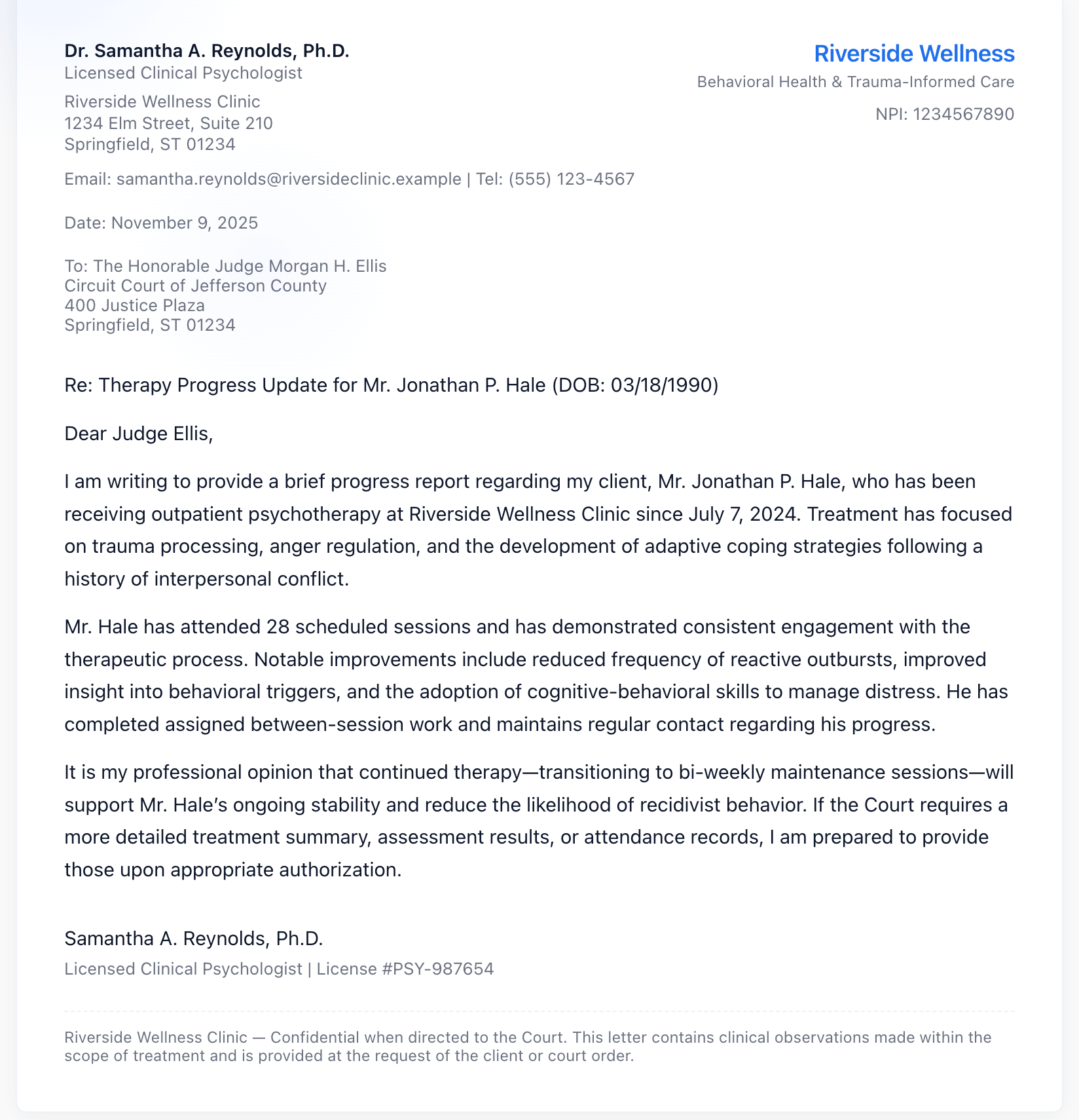When therapy progress or treatment information is needed for court proceedings, writing a clear and professional letter becomes crucial. Whether you’re a therapist, counselor, or mental health professional, these letters serve as formal documentation that can influence court decisions.
Below are sample letters including therapy progress reports, treatment summaries, and confirmation letters that can be adapted for various legal or clinical needs. Each example is carefully crafted to maintain professionalism and confidentiality while ensuring clarity and purpose.
Sample Letter To Judge Regarding Therapy Progress
[Your Name]
[Your Title/Qualification]
[Your Clinic/Practice Name]
[Address]
[City, State, ZIP]
[Email Address]
[Phone Number]
Date: [MM/DD/YYYY]
To:
The Honorable [Judge’s Name]
[Court Name]
[Court Address]
Subject: Therapy Progress Report for [Client’s Full Name]
Dear Judge [Last Name],
I am writing to provide an update regarding the therapy progress of my client, [Client’s Name], who has been under my care since [Start Date]. Throughout our sessions, we have focused on addressing [specific issues, e.g., anger management, anxiety, substance use, or trauma recovery].
[Client’s Name] has shown significant progress in understanding triggers, improving emotional regulation, and developing coping mechanisms. Attendance and engagement have been consistent, and their commitment to therapy goals remains strong.
It is my professional opinion that continued therapy will further strengthen [Client’s Name]’s stability and personal growth. Please let me know if any additional information or documentation is required.
Sincerely,
[Your Name, Credentials]
[License Number if applicable]
Sample Treatment Summary Letter
This letter serves as a summary of treatment for [Client’s Name], who attended therapy at [Clinic Name] from [Start Date] to [End Date]. The focus of treatment included [key areas, e.g., anger control, communication skills, family relationships].
During this period, [Client’s Name] attended [number] sessions and demonstrated measurable improvement in behavioral awareness and coping strategies. It is recommended that they continue maintenance sessions to sustain the progress achieved.
Letter From Therapist Confirming Treatment
This is to confirm that [Client’s Full Name] has been receiving therapy sessions with me at [Clinic/Practice Name] since [Start Date]. The sessions have been conducted [weekly/bi-weekly] and focus on [issues being treated].
[Client’s Name] has been compliant with attendance and actively participates in the therapeutic process. This confirmation is provided upon request for legal or court documentation purposes.
Sample Court Report From Therapist
This court report outlines the therapeutic work conducted with [Client’s Name]. Sessions began on [Start Date], focusing on [primary therapy goals]. Progress has been steady, with improvements noted in areas of [emotional regulation, behavioral awareness, communication].
The client has attended [number] out of [total possible] sessions and has demonstrated ongoing engagement. In my professional assessment, continued therapy would be beneficial in ensuring long-term behavioral stability and emotional wellness.
Sample Letter From Therapist To Judge
Your Honor,
I am writing on behalf of my client, [Client’s Name], who has participated in therapy since [Start Date]. Over this period, we have worked on [specific goals], and [Client’s Name] has made meaningful progress.
Their consistent participation and willingness to apply learned strategies outside of sessions demonstrate genuine commitment to personal change. It is my belief that this ongoing therapeutic process will support their rehabilitation and future success.
Respectfully,
[Your Name, Credentials]
Sample Court Letter From Counselor
As the counselor for [Client’s Name], I wish to report that therapy commenced on [Start Date] and continues to date. The client has been proactive in discussing behavioral challenges and implementing new coping techniques.
Throughout counseling, notable progress has been observed in emotional control and accountability. Continued counseling sessions are encouraged for sustained growth and long-term stability.
Tips For Writing A Professional Therapist Letter To Court
Keep The Letter Objective And Factual
Avoid personal opinions or emotional tones. Focus strictly on observable behaviors, attendance, treatment goals, and measurable outcomes. Use neutral, professional language that maintains the client’s confidentiality while meeting court requirements.
Use Proper Formatting And Structure
Each letter should have clear headers including your name, credentials, contact information, and date. Maintain a formal tone and ensure all information is verifiable. Structured paragraphs help judges and attorneys quickly identify relevant information.
Highlight Progress And Recommendations
Courts often seek insight into whether a client is improving and if continued therapy is advised. Provide a concise summary of the client’s progress, specific areas of growth, and any recommendations for ongoing treatment or follow-up care.
Protect Client Confidentiality
Only disclose information that is legally permissible or explicitly requested by the court. Avoid sensitive personal details unless relevant to the case. Obtain client consent whenever possible before submitting a letter.

Related: